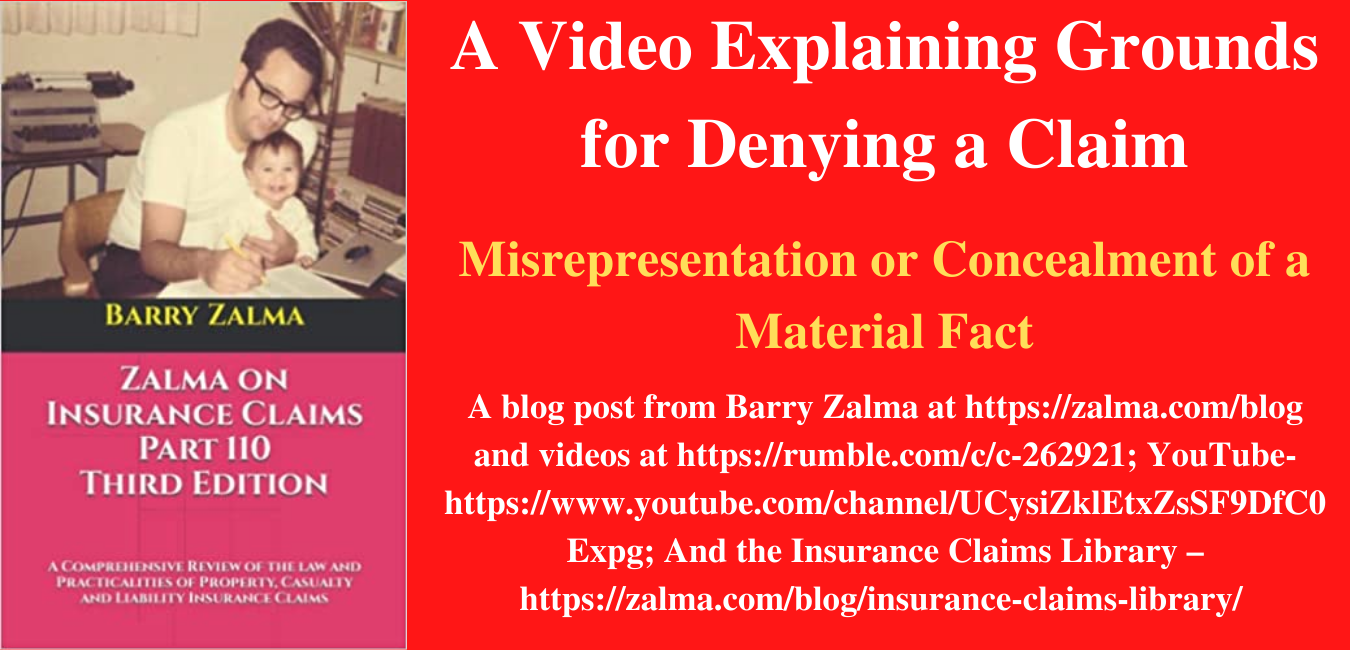-
News Feed
- EXPLORE
-
Pages
-
Groups
-
Events
-
Blogs
-
Marketplace
-
Offers
-
Jobs
-
Developers
A Video Explaining Grounds for Denying a Claim

Misrepresentation or Concealment of a Material Fact
Read the full article at https://lnkd.in/gpMenJax and see the full video at https://lnkd.in/gKKucQyc and at https://lnkd.in/gxn2iN7A and at https://zalma.com/blog plus more than 4000 posts.
To constitute fraud, an insured must have concealed or misrepresented a material fact with the intention of inducing an insurer to pay a claim it would not, otherwise owe had it known the true facts. The facts that are deemed to be “material” for purposes of denying a claim or voiding a policy are not clearly defined and therefore each case must be evaluated separately.
Generally, a fact is material to the application for insurance if it might have influenced a reasonable insurer in deciding whether to accept or reject the risk on the same terms and conditions. Material facts intentionally concealed or misrepresented with intent to mislead the insurer that result in damage to the insurer are fraudulent. Fraud, at the option of the insurer, allows the insurer to void the policy. A misrepresentation after a loss as to a single material fact will forfeit the entire insurance contract.
An insured cannot commit a “small” fraud any more than he can be just a little dead. Once caught in a small fraud, the insured cannot demand that he or she be paid the legitimate part of the claim and expect the insurer to forgive the attempted fraud.
In some states, like California and New York, when misrepresentations as to material facts made in an application for insurance, existence of a fraudulent intent to deceive is not essential to the avoidance of the policy. In these states, applying what has been called the “marine rule” a policy can be rescinded (that is, declared void from its inception) for an innocent misrepresentation or concealment of a material fact.
Fraudulent intent is rarely susceptible to direct proof and must ordinarily be established by circumstantial evidence and the legitimate inference arising therefrom.
Falsely sworn statements are always material. False statements are material if they might have affected the attitude and action of the insurer. They are equally material if they were calculated to discourage, mislead, or deflect the company’s investigation in any area.
ZALMA OPINION
Before an insurer decides to deny a claim it must have conducted a thorough investigation that establishes, beyond a preponderance of all available evidence, that the claim is one that is not covered by the policy. In addition, if the claim includes evidence of fraud, it is essential that there is strong evidence sufficient to require the insurer to report to the state the suspicion that a fraud is being attempted or has succeeded.
© 2021 – Barry Zalma
We are 100% funded for October.
Thanks to everyone who helped out. 🥰
Xephula monthly operating expenses for 2024 - Server: $143/month - Backup Software: $6/month - Object Storage: $6/month - SMTP Service: $10/month - Stripe Processing Fees: ~$10/month - Total: $175/month
- Art
- Causes
- Crafts
- Crime
- Dance
- Drinks
- Film
- Finance
- Fitness
- Food
- Games
- Gardening
- Health
- Home
- Literature
- Music
- Networking
- Paranormal
- Other
- Politics
- History
- News
- Party
- Science
- Religion
- Shopping
- Sports
- SyFy
- Politically Incorrect
- Philosophy
- Theater
- Technology
- Wellness



